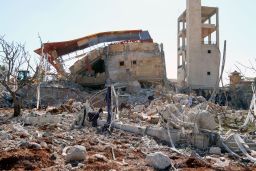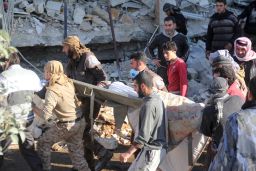Story highlights
NEW: "The situation is desperate," Doctors Without Borders official says
At least 15 people are dead and up to 40 are wounded after strikes in Azaz
In a separate attack, seven people are killed at a hospital in Idlib province
Rescuers wearing hard hats searched through rubble for survivors in northern Syria Monday after airstrikes hit two hospitals and a school building.
The attacks killed at least 22 people, according to reports. Eight others are missing and presumed dead.
Amnesty International said the hospital attacks amounted to war crimes. Critics of the Syrian government warned that the latest violence is yet another troubling sign that a planned “cessation of hostilities” in the war-ravaged country is far from taking hold.
Fifteen people were killed when a hospital and a school building that was housing displaced people were struck in Azaz, in Syria’s Aleppo province, according to a hospital worker on the scene. Up to 40 other people were wounded.
In Aleppo, one man’s story of fear, defiance and survival
Staff members were evacuating the wounded after the first strike on the Women and Children’s Hospital when the complex and a road leading to the Turkish border were struck again, a hospital employee known as Moudhar told CNN. Women and children were among the dead, he said. Another projectile hit the nearby school building, he said.
Germany: Support for no-fly zone
German Chancellor Angela Merkel told the German newspaper Stuttgarter Zeitung that “in the current situation” she would support the creation of a no-fly zone in Northern Syria to create a safe haven for fleeing families, which could offer at least a partial solution to Europe’s refugee crisis.
“In the current situation, it would be helpful if there were areas there, where no party to the war flew bombing missions – in other words a kind of no-fly zone,” she said in response to a direct question from a reporter about her position on exclusion zones.
“We can’t negotiate with the terrorists from ISIS. But if it were doable to come to such an agreement with the anti-Assad coalition and the Assad supporters, it would be helpful.”
Turkey has long advocated the creation of a no-fly zone in northern Syria, despite bombing Kurdish positions in the region.
Missile attack on hospital
In a separate attack about 100 km (62 miles away), another horrifying scene played out at a hospital supported by Doctors Without Borders at Maarat al-Numan in Syria’s Idlib province.
Missiles struck the hospital four times within minutes, the medical humanitarian organization said.
Images from the scene showed the hospital reduced to mostly twisted metal and other rubble.

At least seven people were killed and eight others were missing and presumed dead, the organization said. The dead consisted of five patients, a caretaker and a hospital guard, while eight staff members were missing. Patients were also unaccounted for, the statement said, but it’s not clear how many.
“The situation is desperate,” said Massimiliano Rebaudengo, Doctors Without Borders’ head of mission.
“This appears to be a deliberate attack on a health structure, and we condemn this attack in the strongest possible terms,” Rebaudengo said
“The destruction of the hospital leaves the local population of around 40,000 people without access to medical services in an active zone of conflict,” he said.

Who was responsible?
Officials around the world traded accusations over who was behind the attacks.
The U.S. State Department condemned the airstrikes, blaming the Syrian regime headed by President Bashar al-Assad for the attack on Azaz.
The Syrian government has not made a statement about the incident.
Speaking in Kiev, Turkish Prime Minister Ahmet Davutoglu blamed Russia for the strikes in Azaz, which is close to the Turkish border, claiming Moscow had targeted the complex with ballistic missiles fired from the Caspian Sea.
Turkish defense minister: ‘No intention’ of sending ground troops into Syria
Moscow did not immediately respond to the accusation.
Doctors Without Borders officials said Syrian government-led coalition forces carried out the strikes on the facility in Idlib.
Syria’s ambassador to Russia blamed the United States and coalition forces for the Idlib attack.
Ambassador Riad Haddad said there is “intelligence information” that proves that coalition warplanes raided the hospital. The United States has said it carried out no military operations in the areas that were hit.
Airstrikes earlier this month killed three people and wounded at least six at a Doctors Without Borders-supported hospital in Daraa governorate, southern Syria, on February 5, the aid group said.
Chaos in northern Syria
Northern Syria has been the scene of intense fighting recently, with Syrian regime forces, backed by Russian air power, pursuing a major offensive on the key city Aleppo, and Turkey bombarding Kurdish People’s Protection Units, or YPG, near Azaz over the weekend.
Turkey said it was a response to shelling from YPG positions. Turkish Defense Minister Ismet Yilmaz said Sunday that his country had no intention of sending ground troops into Syria, amid international concern about Ankara’s actions.
The United States and France called on Ankara to halt the bombardment, which killed two Kurdish fighters and wounded seven others, according to a London-based monitoring group, and Syria complained to the U.N. Security Council about the Turkish shelling.
Turkey considers the YPG a terrorist group, while the United States backs it in the fight against ISIS.
Western powers have also been critical of Russia’s actions in Syria, saying it was undermining the prospects of implementing a recently agreed upon cessation of hostilities by bombing civilians. Moscow denies the allegations.
“The intensified bombings, the displacement, the fact that civilian entities have been hit by the regime and its backers, is of grave concern,” U.S. National Security Adviser Susan Rice told reporters Monday. “It does call into question Russia’s willingness or ability to implement the agreements achieved in Munich.”
CNN’s Nick Paton Walsh, Stephanie Halasz, Nicole Gaouette, Catherine E. Shoichet, Hande Atay, Marilia Brocchetto, Ben Brumfield and Euan McKirdy contributed to this report.



















